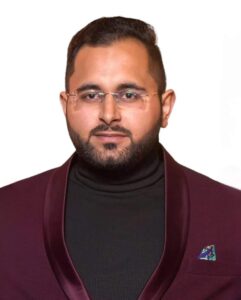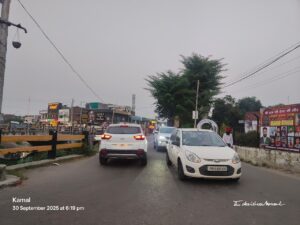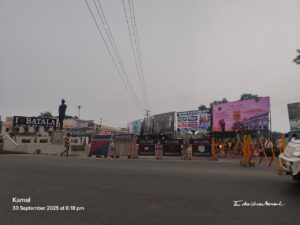
An initiative that started in the small city of Batala, India, has now become a global blueprint for communities worldwide, demonstrating how ordinary citizens can leverage a powerful platform like the Human Rights Commission (HRC) to solve their local issues. This story isn’t just about preventing accidents; it proves that administrative negligence is ultimately an issue of human rights.
The struggle of Kamal Kumar, who compelled the Batala Municipal Corporation and Police Administration to find a permanent solution, presents a new model for Citizen Accountability on a global scale.
A Tale of Tragedy, A Universal Solution
The case concerns the curve on Jalandhar Road near Vishal Mega Mart, where Kumar’s friend, Rohit, died in a road accident on February 15, 2025. This tragedy was reportedly a result of previous fatalities on May 4, 2023, and a poorly designed road layout.
Kamal Kumar demonstrated that when local bodies (Municipal Corporation and PWD) refuse to take responsibility, citizens should view the problem in the context of their fundamental rights.
Road Safety = Right to Life
A perpetually unsafe road that causes continuous fatalities is a direct violation of a citizen’s most basic human right—the Right to Life. Kamal Kumar didn’t just frame this as a case of negligence; he presented it as a violation of human rights before the Punjab State Human Rights Commission (PSHRC).
The HRC Model: A Blueprint for Global Citizens
The Batala model illustrates how citizens in any corner of the world can raise their local administrative issues (such as bad roads, contaminated water, lack of healthcare, or illegal encroachments) through the HRC:
Simple Accessibility: Kamal Kumar submitted the complaint to the Commission via WhatsApp. This proves that complex bureaucratic procedures are not always necessary for justice.
Prompt Action: The HRC took the matter seriously, and a bench led by Chairperson Justice Sant Parkash delivered a decisive order on September 12, 2025.
Result-Oriented Pressure: The Commission didn’t just ask the Batala Municipal Corporation for a report; it directed them to submit the final report only after the permanent work was completed and before the next hearing on December 17, 2025. This ensures that officials bring about solutions on the ground, not just paperwork.
Conclusion: A New Era of Accountability
Following this global pressure and the HRC’s order, the Batala administration has also initiated immediate action. As per the PSHRC letter, the Commissioner of the Batala Municipal Corporation has confirmed discussions regarding the installation of permanent cement dividers.
The lesson from Batala is clear: citizens of any country should view their local problems not as passive inconveniences but as violations of human rights. The HRC is the powerful platform that can hold authorities accountable for protecting the Right to Life. Citizens worldwide should now adopt the Batala Model to solve their local issues.


